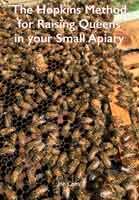Raise your own Queens and improve your stock. The Hopkins method requires no purchasing of queen rearing materials or kits, nor learning curve and skills required of grafting.
Beekeeping presents many challenges, and one of the most troublesome is finding colonies with no queens.There are queen suppliers who are more than willing to sell you some queens, but the prices of these “royal highnesses” seem to be increasing each year.
You can raise your own queens, and there are a wide range of choices for this. Most of the techniques are usually designed for raising many queens, and involve intricate tools and procedures. Some of the equipment beekeepers purchase to raise queens include grafting tools, cell bars, plastic cell cups, plastic cell protectors, candy caps, and queen cages. There are even complete queen rearing kits that include everything you need plus instructions. Some of the common methods associated with queen rearing are the Jenter, Nicot, and Doolittle systems.
The other option, which is an often overlooked is a simple method to producing your own high quality queens from your own stock: the Hopkins Method. Best of all, this method requires no purchasing of queen rearing materials or kits, nor learning curve and skills required of grafting.
Joe Conti clearly explains this in The Hopkins Method for Raising Queens in your Small Apiary.
Joe Conti, a Bronx NY, USA native, has lived in the state of Georgia in the USA for 35 years. He has a MS degree in Wildlife Ecology from the University of Florida and worked as a Wildlife Biologist specializing in wildlife diseases at both the Universities of Florida and Georgia. He has published on a variety of issues related to wildlife, including articles in the American Bee Journal. He also taught Biology and Environmental Science in Middle and High School. A beekeeper for 26 years, Joe has served as President of the Oglethorpe County (GA) Bee Club, and in various positions for it and the Eastern Piedmont Beekeepers Association (Athens GA). He currently is enjoying retired life (and his bees!) on his 6-acre parcel in rural Oglethorpe County.



